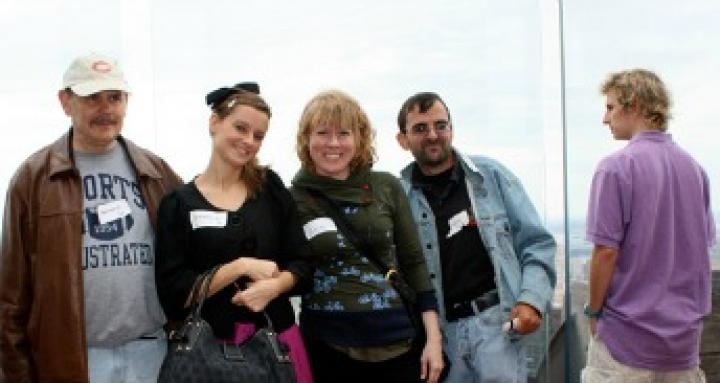Share

The following article by Anna Schechter, Supervisor of our Hankering for More socialization program, appeared in the spring issue of NYMetroParents . She has worked in creative arts and socialization programs for adults with developmental disabilities for 10 years. She earned her master’s in social work from Columbia University.
We've got it wrong. When it comes to individuals on the autism spectrum, conventional wisdom tells us they lack the desire to connect with others. The truth is that they may not want to connect with others in the black-and-white way we usually think about connection.
 We tend to categorize people as either social or not, but social interaction is something much more complex. As parents, family members, and professionals, we need to expand our thinking and start asking different questions. It's not "Do you want to connect with others?" but, more aptly, "With whom and how do you want to connect?" and "What social roles are important to you, and why?"
We tend to categorize people as either social or not, but social interaction is something much more complex. As parents, family members, and professionals, we need to expand our thinking and start asking different questions. It's not "Do you want to connect with others?" but, more aptly, "With whom and how do you want to connect?" and "What social roles are important to you, and why?"
Defining Friendship
My job as supervisor of a socialization program is to support adults with autism and developmental disabilities in making and maintaining friendships. Day in and day out, I see the desire for people with autism to connect and relate to others, although this desire often looks a little different than what I may expect.
Individually, we all have our own vision of friendship. I want a friend who can lead me to the best French fries in New York, remind me to laugh, and encourage me to try new things. Informed perhaps by our life experiences, those around us, and cultural norms, this definition is how we make assessments about who we let into our social world.
What I've come to realize, after asking dozens of people what friendship means to them, is that not all definitions look the same and, more importantly, that's OK. The desire to connect on some level is constant, but what it means to connect and how people want to achieve this goal is personal and varied. One person wants a friend who answers his questions and who he can talk to when he has a bad day. Another person wants a friend who won't borrow money, and another sees a friend as someone who will celebrate the birthdays of the royal family with him.
Power Shift
Going straight to the source and asking people how, with whom, and with what frequency they want to connect seems like an obvious approach, but this is far from the norm. We tend to assume what someone with autism wants when we should place the decision-making power in his or her hands. Shifting power to the individual has the potential to impact not only the way families and caregivers support him or her, but also the future services he or she may receive, as well as the way we ally and advocate. Far too often our energies, efforts, and services are focused on something a person doesn't actually want for him- or herself, and then we're left with the same question: Why isn't this working?
Hurdles and Help
Once you ask and truly listen, putting your definitions and expectations aside, you can start supporting your loved one in developing meaningful connections. We all have individual differences in terms of our social skill sets, and individuals with autism are no different. Social interaction is full of gray areas and nuance, and these subtle cues can be challenging to navigate. Regardless of someone's individual friendship definitions or goals, there is often a benefit to skill development. Some social hurdles may include:
- interpreting the thoughts and feelings of others
- coming up with social solutions for friendship dilemmas
- understanding body language
- initiating and maintaining conversations
It is easy to assume that a person who isn't making eye contact while introducing him- or herself doesn't have the desire to connect. The social expectation is that someone will look you in the eye when saying hello. For many people, this nonverbal cue helps to relay the message that you are paying attention and interested in connecting. Other people, however, may need a work-around, such as the following social script: "Hi, it's nice to meet you, John. My name is Sam. Sorry I'm not looking at you, I don't mean to offend. It's just that sometimes eye contact makes me feel a little uncomfortable. Do you like action movies?" This script provides Sam with a way to work toward his particular social goal of finding someone to watch action movies with and conveys the message that he is paying attention without the use of sustained eye contact.
Debunking the Myth
I am routinely reminded that connections come in different shapes and forms. Recently, when at a sushi restaurant with a group of young adults with autism, I noticed something I had never seen before. With only a brief pause for ordering their lunch, two group members, sitting directly next to one another, were having a back-and-forth conversation entirely through their smart phones. Despite the fact that they were close enough to bump knees, the complete content of their conversation and the crux of their connection was occurring solely through text message. The typical components of connection — engagement, reciprocity, and mutual respect — were all there. However, the form was new to me.
Part of the education and acceptance must come from the community. Just as we acknowledge that everyone defines friendship differently, we must accept that not all social interactions are going to look the same. Only with this acceptance will we begin to break down the societal myth that those on the autism spectrum prefer exclusion to inclusion.
For decades, placement in large institutions was the standard way we supported individuals with autism and other developmental disabilities. After many of those institutions closed, quality care was defined primarily as ensuring someone was safe and had food, shelter, and medical care. However important these basic needs are, they are not considered prominent indicators of a quality life. At the end of your life, are you going to recall the quality of your dental care or the feeling of being valued by the social roles you inhabited as a brother, uncle, assistant store clerk, and friend?
At YAI, we’re asking questions and listening to the children and adults we support, as well as their family members, to ensure we understand what is important to them. We’re learning that having meaningful connections with others and valuable social roles is fundamental, and it feels like we're finally starting to get it right.
